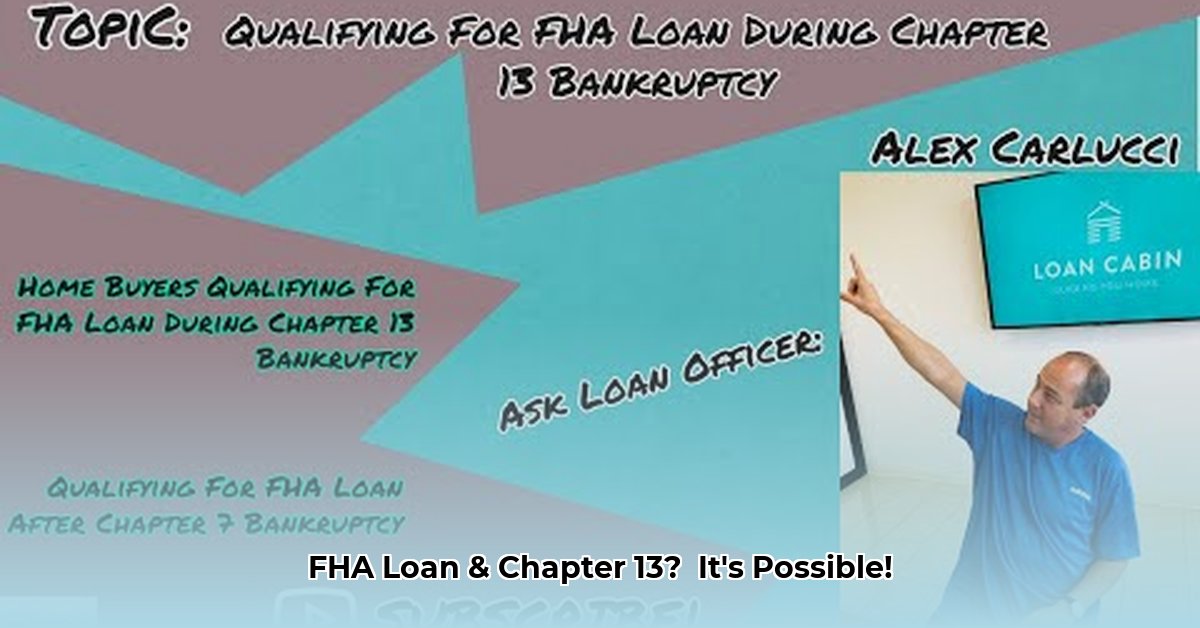
Understanding FHA Loans and Chapter 13 Bankruptcy
Facing Chapter 13 bankruptcy and still dreaming of homeownership? It might seem daunting, but securing an FHA loan is entirely possible. This guide provides a step-by-step approach to navigating this complex process, offering practical advice and strategies to increase your chances of approval. While challenging, obtaining an FHA loan during Chapter 13 is achievable with careful planning and perseverance.
Remember, an FHA loan isn't a loan directly from the Federal Housing Administration (FHA); instead, the FHA insures loans from approved lenders. This insurance reduces the lender's risk, making them more open to borrowers with less-than-perfect credit, which can be beneficial after bankruptcy. Chapter 13 bankruptcy, a debt repayment plan lasting 3-5 years, allows you to restructure your debts and potentially reclaim your financial stability. Securing an FHA loan during Chapter 13 requires demonstrating financial responsibility throughout your repayment plan to gain the lender's trust.
Eligibility Requirements: Key Considerations for FHA Loan Approval
Several factors influence your eligibility for an FHA loan while in Chapter 13. Let's address the key elements:
Waiting Period: While the FHA itself may not mandate a lengthy waiting period after Chapter 13 discharge, individual lenders often have stricter policies. Expect a wait, often a year or more, depending on your payment history and overall financial picture. Consistent, on-time payments during your Chapter 13 plan significantly impact lender decisions.
Credit Score: Your credit score plays a pivotal role. A higher score demonstrates creditworthiness, greatly increasing your chances of approval. Consistent on-time payments during Chapter 13 are vital for rebuilding your credit.
Debt-to-Income Ratio (DTI): This ratio (your monthly debt payments divided by your gross monthly income) is a crucial factor. A lower DTI shows lenders you can comfortably manage additional debt. Reducing debt before applying and maintaining consistent Chapter 13 payments are crucial in this regard.
Court Approval: Securing court approval to take out a new mortgage is essential. This requirement ensures your Chapter 13 plan isn't jeopardized by the new debt. The court will review your application and assess the potential impact on your existing repayment schedule.
The Chapter 13 Process and FHA Loan Application: A Step-by-Step Guide
Successfully navigating the application process requires a methodical approach:
Consistent Payments: Maintain perfect payment history throughout your Chapter 13 plan. This demonstrates your commitment to financial responsibility.
Pre-Approval: Seek pre-approval from multiple lenders. This provides valuable insight into interest rates and terms, and it demonstrates your seriousness to lenders.
Documentation: Gather all necessary financial documentation: proof of income, debt summaries, and records of consistent on-time payments during Chapter 13. Thorough preparation minimizes delays.
Court Approval: Formally request court permission for the new mortgage. This involves submitting the necessary paperwork to the bankruptcy court handling your Chapter 13 case.
Housing Counseling: Complete FHA-approved housing counseling. This demonstrates your understanding of homeownership responsibilities and enhances your application.
Application Submission: Submit your complete application package to your chosen lender.
Underwriting and Closing: The lender will review your application. This final step takes time. Keep in touch with your lender during this period and address any questions promptly.
The "Back to Work" Program: A Potential Advantage
The FHA's "Back to Work" program offers potential benefits to borrowers facing financial hardships. This program may allow for more flexible credit score requirements and expedite the loan process. However, eligibility criteria are stringent. Thoroughly research the program's requirements to determine if it aligns with your situation.
Strategies for Improving Eligibility: Proactive Steps
Credit Repair: Aggressively work to improve your credit score. Pay all bills on time and keep your credit utilization low (the amount of credit you're using compared to your total available credit).
Debt Reduction: Prioritize reducing existing debts. This lowers your DTI and strengthens your application significantly.
Financial Discipline: Establish a solid budget and stick to it. Demonstrating consistent and responsible financial management is crucial.
Working with Lenders: Finding the Right Partner
Selecting the right lender is critical. Some lenders specialize in working with borrowers who have experienced bankruptcy. Inquire about their experience with FHA loans and Chapter 13 cases. Open communication is vital.
Potential Challenges and Solutions
Lender Discretion: Lenders have some flexibility in interpreting guidelines. Be prepared to address any concerns they raise.
Documentation Issues: Ensure all paperwork is accurate and complete. Missing or incomplete documentation is a common cause of delays.
Conclusion: Your Path to Homeownership
Securing an FHA loan during Chapter 13 demands due diligence, patience, and persistence. By carefully following the steps outlined in this guide and actively working to improve your credit and manage your finances responsibly, you can significantly increase your chances of achieving homeownership. Remember to seek professional financial advice to support you throughout this process. Your dream of homeownership is attainable; make it a reality.